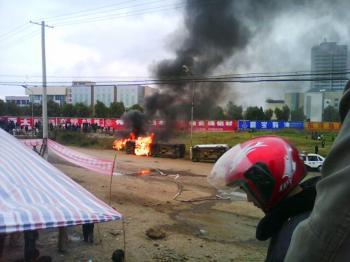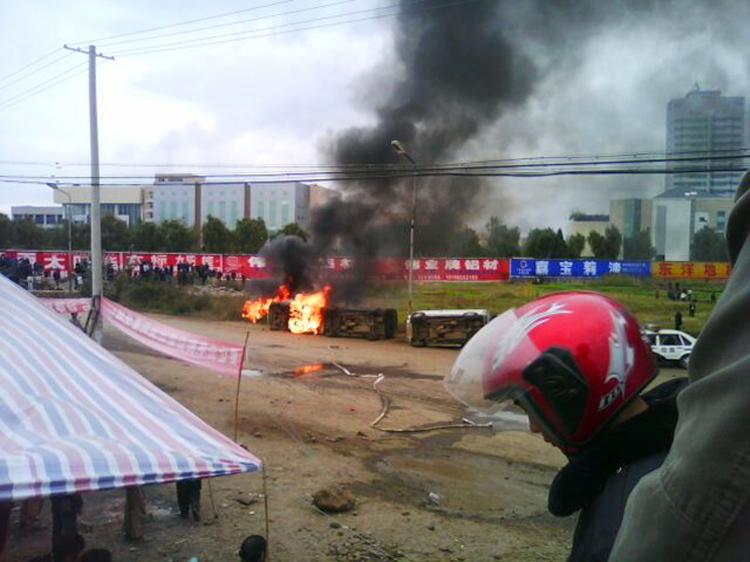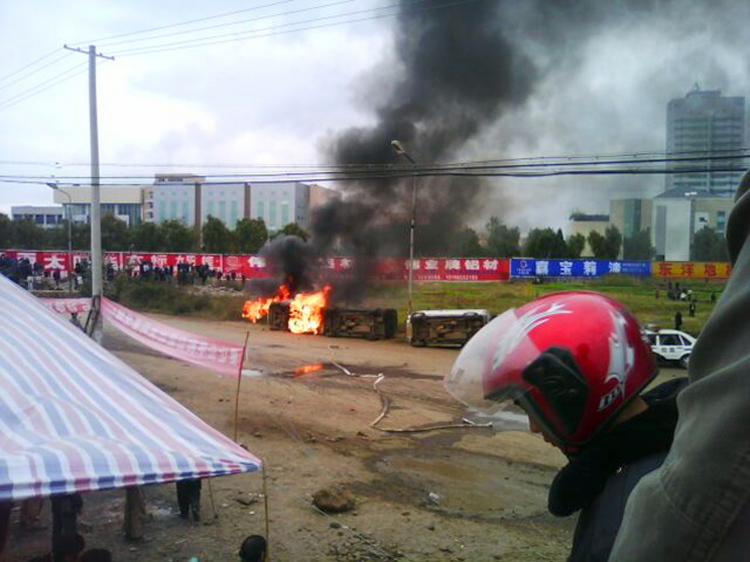Huge sums of money embezzled by petty officials in China have attracted much attention in recent years. At least 17 cases of lower level government officials who have embezzled over ten million yuan (US$1.53 million) since 2001 have been reported by Chinese media, with six of them involving an amount around 100 million yuan (US$15.28 million).
Southern Weekly, on March 31, reported that a Supreme Court judge specializing in crimes related to dereliction of duty, indicated that many cases have not been made public.
Some protagonists in these corruption cases are local government officials at the bottom level of the administrative hierarchy, including those who are not really counted as officials, such as village cadres, petty clerks, and even the foreman of a cleaning service team, the report said.
Investigation and studies by various sources have shown that corruption of low level officials has been escalating in the last three years. Thirteen of the seventeen reported cases by Southern Weekly were investigated after 2008.
Land grabs everywhere in China have also resulted in corrupt village cadres. Liu Huaiyin, a Party Secretary of a small community in Luyang District, Hefei City of Anhui Province, for one, has accepted nearly ten million yuan (US$1.53 million) in bribes from 2001 to 2008. Among the eleven bribes that he was accused of taking, nine involved land acquisition. Chinese state media called him the “number one greedy village cadre in Anhui.”
Wang Yuanli, the foreman of a cleaning service team made it to the top of the list of officials who have embezzled the most amount of money in Yanshan District in Beijing. He was reported by state media to have embezzled 2.2 million yuan (US$340,000) in eight years, mostly in cleaning fees.
But the field of natural resources offers the greatest scope for officials to dip their hands in the pot. A small department can end up controlling the local economy in some cases. In Laiyang City of Hunan Province, a tax collection and management office of mineral resources has been collecting 400 million yuan (US$61.10 million) of annual tax since 2004, accounting for one quarter of the city’s revenue. Last year a total of 55 staff were investigated for corruption.
The power of an official is not necessarily related to his ranking alone. Many petty officials have, over a period of time, built up a complicated network and thus have become self-made powerbrokers in certain areas..
Often, behind low-ranking officials there are higher-ranked patrons operating, but they don’t get exposed when the petty official is exposedt, the Southern Weekly report said.
The report cited an example: in 2006, Geng Xiaoju, a financial officer in Hankou Train Station in Wuhan City, Hubei Province was on trial for embezzling over eight million yuan (US$1.22 million). Liu Zhixiang, then deputy director of the Wuhan Railway Bureau, was under investigation at the same time. Five years later, Liu’s brother, Liu Zhijun who was then Railway Minister was sacked on charges of corruption.
Cases of embezzlement and corruption by high ranking officials have also been published by Chinese media in the past, but a report containing precise data was “purged for supposed violations of propaganda discipline,” according to the China Media Project.
Economics professor Zhao Xiao of the University of Science and Technology in Beijing published an article in Shanghai Securities News on Oct. 20, 2006, citing a joint research report by the Research Office of the State Council, the Research Office of the Central Party School, the Research Office of the Central Propaganda Department, the Chinese Academy of Social Sciences and other government offices.
The report, which was cited by China Media Project and prominent economist He Qinglian, stated that as of the end of March 2006, the number of people in China with assets in excess of 50 million yuan (US$7.64 million) was found to be 27,310; while 3,220 had assets in excess of 100 million yuan (US$15.28 million), among which 2,932 were the sons and daughters of senior officials whose total assets amounted to 2.05 trillion yuan (US$31 billion), accounting for 91 percent of those with assets over 100 million.
Zhao’s article also stated that investigation showed that these assets were mostly acquired illegally, or ostensibly legally but by taking advantage of family members’ background and power.
In the five years since that report’s publication the wealth embezzled by officials of all ranks is estimated to have grown in leaps and bounds, including the recent high profile case of former Railway Minister, Liu Zhijun.
Chinese communist deputy leader, Wen Jiabao admitted in a State Council meeting on March 25 that corruption is still pervasive. Observers unanimously pin this on the arbitrary, opaque, and autocratic nature of Communist Party rule.
[email protected]
Read the original Chinese article
Southern Weekly, on March 31, reported that a Supreme Court judge specializing in crimes related to dereliction of duty, indicated that many cases have not been made public.
Some protagonists in these corruption cases are local government officials at the bottom level of the administrative hierarchy, including those who are not really counted as officials, such as village cadres, petty clerks, and even the foreman of a cleaning service team, the report said.
Investigation and studies by various sources have shown that corruption of low level officials has been escalating in the last three years. Thirteen of the seventeen reported cases by Southern Weekly were investigated after 2008.
Land grabs everywhere in China have also resulted in corrupt village cadres. Liu Huaiyin, a Party Secretary of a small community in Luyang District, Hefei City of Anhui Province, for one, has accepted nearly ten million yuan (US$1.53 million) in bribes from 2001 to 2008. Among the eleven bribes that he was accused of taking, nine involved land acquisition. Chinese state media called him the “number one greedy village cadre in Anhui.”
Wang Yuanli, the foreman of a cleaning service team made it to the top of the list of officials who have embezzled the most amount of money in Yanshan District in Beijing. He was reported by state media to have embezzled 2.2 million yuan (US$340,000) in eight years, mostly in cleaning fees.
But the field of natural resources offers the greatest scope for officials to dip their hands in the pot. A small department can end up controlling the local economy in some cases. In Laiyang City of Hunan Province, a tax collection and management office of mineral resources has been collecting 400 million yuan (US$61.10 million) of annual tax since 2004, accounting for one quarter of the city’s revenue. Last year a total of 55 staff were investigated for corruption.
The power of an official is not necessarily related to his ranking alone. Many petty officials have, over a period of time, built up a complicated network and thus have become self-made powerbrokers in certain areas..
Often, behind low-ranking officials there are higher-ranked patrons operating, but they don’t get exposed when the petty official is exposedt, the Southern Weekly report said.
The report cited an example: in 2006, Geng Xiaoju, a financial officer in Hankou Train Station in Wuhan City, Hubei Province was on trial for embezzling over eight million yuan (US$1.22 million). Liu Zhixiang, then deputy director of the Wuhan Railway Bureau, was under investigation at the same time. Five years later, Liu’s brother, Liu Zhijun who was then Railway Minister was sacked on charges of corruption.
Cases of embezzlement and corruption by high ranking officials have also been published by Chinese media in the past, but a report containing precise data was “purged for supposed violations of propaganda discipline,” according to the China Media Project.
Economics professor Zhao Xiao of the University of Science and Technology in Beijing published an article in Shanghai Securities News on Oct. 20, 2006, citing a joint research report by the Research Office of the State Council, the Research Office of the Central Party School, the Research Office of the Central Propaganda Department, the Chinese Academy of Social Sciences and other government offices.
The report, which was cited by China Media Project and prominent economist He Qinglian, stated that as of the end of March 2006, the number of people in China with assets in excess of 50 million yuan (US$7.64 million) was found to be 27,310; while 3,220 had assets in excess of 100 million yuan (US$15.28 million), among which 2,932 were the sons and daughters of senior officials whose total assets amounted to 2.05 trillion yuan (US$31 billion), accounting for 91 percent of those with assets over 100 million.
Zhao’s article also stated that investigation showed that these assets were mostly acquired illegally, or ostensibly legally but by taking advantage of family members’ background and power.
In the five years since that report’s publication the wealth embezzled by officials of all ranks is estimated to have grown in leaps and bounds, including the recent high profile case of former Railway Minister, Liu Zhijun.
Chinese communist deputy leader, Wen Jiabao admitted in a State Council meeting on March 25 that corruption is still pervasive. Observers unanimously pin this on the arbitrary, opaque, and autocratic nature of Communist Party rule.
[email protected]
Read the original Chinese article


